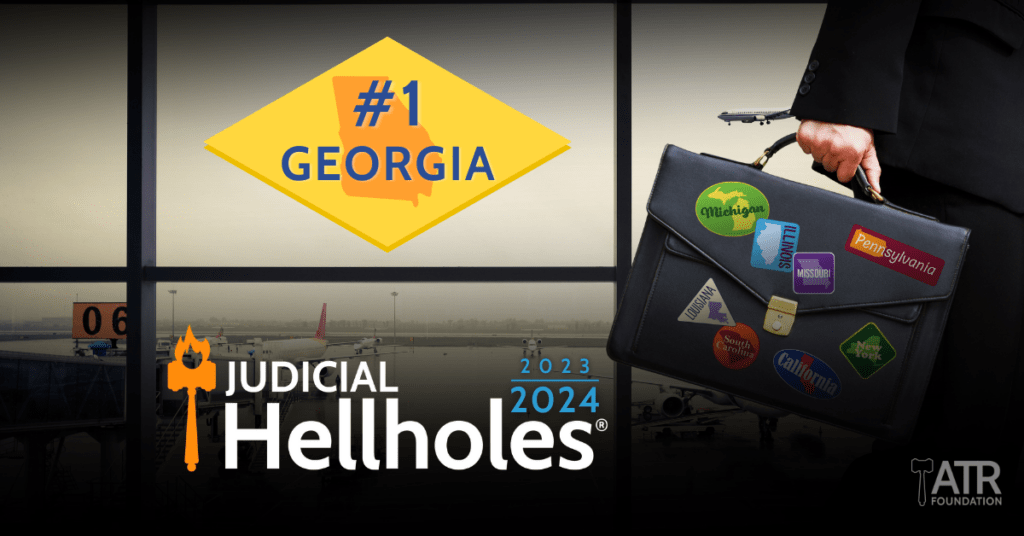‘Highly Unusual’ Rehearing of Louisiana Case Raises Judicial Independence Concerns
Louisiana Supreme Court Waffles Under Political Pressure, ATRA Brief Urges Court to Stand Strong

Georgia’s Legal Landscape Negatively Impacts Businesses, Communities, Pocketbooks
The verdict is in: Georgia has the dubious honor of No. 1 worst Judicial Hellhole® in the nation.
This designation from the American Tort Reform Foundation’s 2023-2024 report reflects a landscape rife with excessive, “nuclear” verdicts, expanded premises liability, and questionable decisions by the Georgia Supreme Court.
“Georgia’s No. 1 Judicial Hellhole® ranking should be a wake-up call,” Tiger Joyce, president of the American Tort Reform Association said. “Lawsuit abuse wipes out billions of dollars in economic activity annually in Georgia and threatens the state’s business-friendly reputation.”
Data reveals that Georgians pay an annual “tort tax” of more than $1,200, while more than 120,000 jobs are lost each year due to excessive tort costs.
Nuclear verdicts, those surpassing $10 million, continue surging in Georgia with one dozen reported last year, including the jaw-dropping $1.7 billion verdict out of Gwinnett County in August 2022. ATRF says Georgia is one of a few states that allow a practice called “anchoring,” which they say contributes to the prevalence of nuclear verdicts in the state. This tactic allows lawyers to suggest an exorbitant award amount before a jury for noneconomic losses such as pain and suffering, creating an “anchor” point in their minds, thereby influencing subsequent decisions.
The report points out several “nuclear” verdicts in Georgia over the past year, ranging from $10.5 million to $160 million in cases that span personal injury, medical liability, and premises liability.
Georgia courts’ reliance on inflated medical bill amounts in awarding damages, known as “phantom damages,” further contributes to their Judicial Hellhole® status. Phantom damages occur when courts allow lawyers to introduce inflated medical bill amounts that were never paid by a patient.
“Georgia courts allowing phantom damages creates windfalls for plaintiffs and their lawyers, but they add to the growing cost of litigation in the state, delay settlements, and increase insurance premiums,” Joyce said.
This year, the Georgia Supreme Court significantly expanded premises liability when it embraced an overly broad “foreseeability” standard. ATRF says this means that property owners can be held liable if it was “reasonably foreseeable” that a third-party criminal act would occur on or near their property, even if they had no prior knowledge or ability to address such activities.
“Expanding premises liability creates significant legal and financial challenges for businesses and property owners in Georgia,” Joyce said. “The unintended consequences, particularly in high-crime areas, may force businesses to close their doors or increase prices to cover the costs of heightened security measures, burdening local economies and neighborhoods.”
In the case at hand, CVS Pharmacy v. James Carmichael, a plaintiff was shot in a store parking lot. The lower court awarded $45 million in damages, imposing 95% of the liability on CVS. The court did not hold the shooter liable. ATRF says this case illustrates how property owners can be held disproportionately responsible for events far beyond their control.
“Clarity and consistency in premises liability law are essential for businesses to operate effectively and for property owners to understand their responsibilities,” Joyce said. “The Georgia Supreme Court’s decisions this year created uncertainty around premises liability, making it even more challenging for businesses and individuals to navigate the state’s legal system.”
The state supreme court also expanded liability in cases related to products liability and wrongful death, now allowing adult children to bring wrongful death suits in the absence of a surviving spouse.
Additionally, the presence of third-party litigation finance in Georgia, coupled with a lack of regulation, fuels lawsuit abuse, according to ATRF’s report. Predatory practices with exorbitant interest rates are a significant concern, with the legislature yet to intervene. The state supreme court went so far as to endorse third-party litigation financing, saying that usury laws do not apply to consumer loans.
“Despite these challenges, there is hope for reform,” Joyce said. “We’re heartened that Gov. Brian Kemp recognizes the need for legal reform and urge citizens, lawmakers, and businesses to collaborate in advocating for positive change. Together, we can safeguard economic vitality, support our small businesses, and restore confidence in Georgia’s legal system.”
Georgia tied for the No. 1 Judicial Hellholes® ranking with Pennsylvania’s courts, specifically the state supreme court and the Philadelphia Court of Common Pleas. This is the first time ATRF has named two No. 1 Judicial Hellholes®.
To learn more about the full range of challenges Georgia faces as a Judicial Hellhole® and the opportunities for growth, visit JudicialHellholes.org and read the comprehensive report.
Louisiana Supreme Court Waffles Under Political Pressure, ATRA Brief Urges Court to Stand Strong
Left unchecked, these jurisdictions will continue dragging down economic growth and undermining justice through rampant lawsuit abuse.
Claimants Given Opportunity to Vote on Plan; Judge to Reconsider Scientific Validity of Plaintiffs’ Experts
Legitimate consumer protection demands sound science and impartial analysis — not distorted data designed to manufacture lawsuits.
Law Firms Spent $168M+ on 2.2M Ads in Georgia
ATRA’s Latest Studies Reveal Financial Influence and Lack of Transparency in Pennsylvania’s Campaign Finance Systems